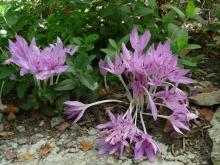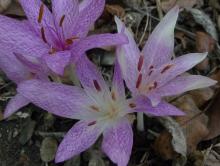Forums:
Does anyone have fall blooming colchicum lawns? We had a talk recently at our Chapter meeting, and the speaker showed a pic of them (in bloom, of course). She seemed to like the idea better than a spring crocus lawn. I'm not so sure. ???
I'd love to hear about the good, the bad or the ugly about them...

Comments
Mark McDonough
Re: Colchicum 2012
Sat, 03/17/2012 - 9:08pmIt's hard to imagine a what a fall blooming colchicum lawn would look like in spring and summer, to make such a garden viable. I remember when visiting John Lonsdale's garden in Pennsylvania, he had a raised bed filled with fall-blooming Colchicum, and of course, the spring/early summer foliage is huge, looking as big and coarse as Skunk Cabbage, and I thought "wow, so much huge and abundant foliage for the wonderful naked blooms in the fall... wise choice to separate these creatures into their own raised bed". I could envision adding dwarf spring-blooming Colchicum to a "spring bulb lawn" that might include crocus, galanthus, corydalis, and other spring ephemerals.
With concepts like "spring blooming Crocus lawns", it certainly works, and there are wonderful examples in Europe shown on the SRGC Forum, all that one needs to do is be somewhat tardy in mowing the lawn to allow the early spring foliage to start dying away... but with fall-blooming Colchicum, the huge leafy foliage would make such a lawn a "weed bed" a couple feet high by the time the foliage could be mowed down.
bulborum (not verified)
Re: Colchicum 2012
Sun, 03/18/2012 - 1:16amI agree with you Mark
To much leaves in spring
There exist (expensive) Colchicum with small leaves
so if you have plenty of money (and time)
good luck
The only time I have seen interesting mass plantations from Colchicum
was in a place covered with Hedera helix
here they planted huge amounts of Colchicum in
This was the only time I found the contrast from leaves interesting
Of-course the flowers in the fall where amazing
R
Trond Hoy
Re: Colchicum 2012
Sun, 03/18/2012 - 11:22amI can't boast of growing a lawn full of Colchiums but I have a lot of them at my summerhouse where they grow fringe the small lawn we have there. And as said here, the leaves are very dominant and not particularly beautiful. They last till midsummer and when they wilt they leave a bare patch for months. However, it is a nice view in the fall.
Once I visited Austria and although I didn't see neither the leaves nor the flowers (we were a bit early for that) I saw pictures of a field full of flowering Colchiums. What a sight! The field was a kind of pasture and when we dug some trenches (it was a scout camp and we dug for removing water) we found bulbs everywhere! No signs of bare patches due to big leaves though.
WimB (not verified)
Re: Colchicum 2012
Sun, 03/18/2012 - 12:13pmDid John combine his Colchicums with something? Like Trond said, they leave a bare patch for a couple of months!!
Richard T. Rodich
Re: Colchicum 2012
Sun, 03/18/2012 - 9:12pmWhat you all are saying is basically what I was thinking.
Although, I still wonder about a Colchicum x agrippum lawn, with its small foliage?
With the unprecedented 79F day today, and nights in the sixties for almost a week now, mine are just peeking out, despite the lack of rainfall.
bulborum (not verified)
Re: Colchicum 2012
Sun, 03/18/2012 - 11:56pmI have Colchicum x aggripinum (you have a little typo Rick) naturalised here
it works good
and has small leaves
but I mow only once a year
so no experience with a lawn
R
Richard T. Rodich
Re: Colchicum 2012
Tue, 04/17/2012 - 7:53pmColchicum x agrippinum foliage, and flowers from last fall.
Mark McDonough
Re: Colchicum 2012
Tue, 04/17/2012 - 8:14pmOh, I like the twisty foliage! Here's foliage of C. doerfleri, with very hairy foliage (a very small species, with small foliage). I think one must judge Colchicum on each species of cultivars individual merits.
Richard T. Rodich
Re: Colchicum 2012
Tue, 04/17/2012 - 8:22pmVery cool, Mark. One may remember a photo I posted of C. x agrippinum foliage I posted in 2009 of a single younger bulb. The difference that maturity makes is evident. Now the stems and foliage are much stronger, robust and heavier textured.
Richard T. Rodich
Re: Colchicum 2012
Thu, 09/06/2012 - 5:26pmSeptember is here, and so are the colchicum!
We seem to be falling into a yearly pattern of fall drought. Some trees are a bit wilty, as is my Euonymus bungeana, but the colchicum seem to not mind. Knowing how colchicum bulbs common in commerce can happily produce flowers when not even planted, I guess that's not a revelation.
They bring some vibrancy back into a tired garden:

Colchicum x agrippinum
And then there is this anomaly: two flowers from the same bulb, one "bleached" at the ends of the petals, the other in the center. In the five years I have had these blooming colchicum, they have always flowered "normally", like the flower at the top of the same photo. However, I can't say with certainty that this particular bulb bloomed before. Anyone know what's going on?

Lori S. (not verified)
Re: Colchicum 2012
Fri, 09/07/2012 - 8:11amI would have just guessed it was an aging flower (the one with "bleached" tips) but I take it all flowers opened at the same time?
Trond Hoy
Re: Colchicum 2012
Fri, 09/07/2012 - 12:39pmRick, you'll have to wait till next fall to see if these new traits are permanent or just caused by some random temperature fluctuation or something.
Richard T. Rodich
Re: Colchicum 2012
Fri, 09/07/2012 - 2:00pmI would think that the two flowers are slightly different ages. But I have had many open flowers so far (I counted 83), some already senesced, and none have exhibited any deviations from homogenously colored petals at any time. I have always assumed that the whole petal develops at a pretty equal rate, but perhaps that is not the case.
Update:

Soon after that pic was taken yesterday, I watered the garden. Now, 25 hours later, both anomalies have almost disappeared!
And all the colchicums seem happier. If there was a water deficit for that one bulb, and petal development differs from one end of a petal to the other, I suppose that could explain it. As Trond says, next year's bloom should tell.
LucS (not verified)
Re: Colchicum 2012
Mon, 09/17/2012 - 9:49pmFlowering season has just started for the autumn colchicum.
Colchicum peloponnesiacum
Colchicum corsicum
LucS (not verified)
Re: Colchicum 2012
Tue, 09/25/2012 - 9:31amA first time flower on Colchicum sfikasianum from S-Greece, first described in 1995.
Seedgrown from an Archibald collection.
Richard T. Rodich
Re: Colchicum 2012
Tue, 09/25/2012 - 5:44pmA pleasing light color, Luc. 8)
Do you know what makes it a new species?
LucS (not verified)
Re: Colchicum 2012
Wed, 09/26/2012 - 10:02pmThis one is related to C. lingulatum that grows on higher habitats (500-2300 m).
Botanically speaking there are differences in leaf shape and in the number of flowers on a bulb (2-5 for C. lingulatum - 1-2 for C. sfikasianum).
LucS (not verified)
Re: Colchicum 2012
Fri, 09/28/2012 - 10:52amA first flower for this season on one of the plants in the C. cupanii complex. These suffered a lot during last winter with a lot of dead one's as a result.
Colchicum cupanii var. pulverulentum from Zaghouan Tunesia.
Richard T. Rodich
Re: Colchicum 2012
Fri, 09/28/2012 - 7:05pmThe petals almost look pleated.
Are my eyes tricking me?
LucS (not verified)
Re: Colchicum 2012
Mon, 10/01/2012 - 10:57amI guess they do Rick.
LucS (not verified)
Re: Colchicum 2012
Mon, 10/01/2012 - 11:01amA less hardy species from Syria (Nebl Nusairi) related to colchicum troodii : Colchicum decaisnei